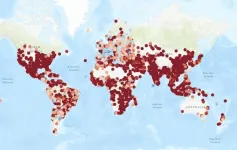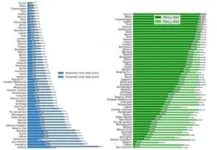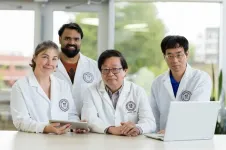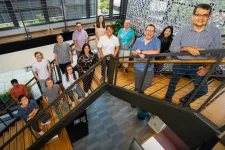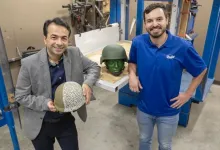(Press-News.org) [Vienna, September 13 2024] – The 15-minute city, a concept where essential services are accessible within a 15-minute walk or bike ride, has become increasingly popular in urban planning in recent years. This is because it offers solutions to several pressing challenges in urban areas, such as traffic, pollution, social isolation, and quality of life. With more than half of the world's population now living in cities—and this figure steadily increasing—these issues are becoming ever more critical.
In a recent study, published in Nature Cities, researchers now provide a worldwide quantification of how close cities are to the ideal of the 15-minute city.
This research team, led by Vittorio Loreto, external faculty member at the Complexity Science Hub, Professor at Sapienza University of Rome and Director and head of the Sustainable Cities Research Line at of the Sony Computer Science Laboratories – Rome (Sony CSL – Rome), then adopted this metric to assess the status of many cities worldwide, and provided an open-access platform (whatif.sonycsl.it/15mincity) for everyone to explore cities or portions of them.
A Global Perspective on City Accessibility
Using this new metric, the team evaluated and compared cities across the globe. “Our results revealed stark disparities in access to services, both within cities and between different regions, meaning that urban areas present a high level of inequality,” explains Loreto. For example, areas with many services in a city could be more expensive and only those who can afford it are able to live there.
“On a global scale, many cities in Europe score highly in terms of accessibility, with Vienna being a prime example. However, most of the cities in the USA, Africa, and parts of Asia require significantly longer times to access basic services,” says Loreto.
Relocation, More Resources, or Both?
The research team didn’t stop at identifying these disparities but went a step further: what if the same resources and services were redistributed? Would it be possible to increase the accessibility, which would lead to less inequality in a city? Or does it require more resources? In short: Does a neighborhood, for example, need a massive transportation enhancement to reach essential services or a more capillary distribution of essential proximity services?
The Relocation Algorithm
The researchers tried to answer these questions by creating a “relocation algorithm,” which will help understand how to increase the number of citizens who can access services in a given urban area and reduce inequalities. In addition, the algorithm is also essential in simulating how a city would respond to an increase in services until it reaches the 15-minute framework and how the number of needed services can vary among different cities. “We observe considerable differences between cities in terms of the minimum number of additional services required to fulfill the 15-minute city concept. Even more interesting, we observe that the very notion of a proximity-based city is not even conceivable in many cases, and a radically new paradigm has to be conceived,” says Loreto.
Beyond Time: Toward Value-Based City Planning
Why is all this important? Fundamentally, it helps us better understand the cities we inhabit, the complex challenges residents face, and the diverse potential solutions. It also highlights that no two cities are alike, meaning each requires unique, tailored approaches to its complexities. The 15-minute city is just one of many frameworks that can help address these challenges. In the study, the researchers concluded, that the merely time-based ideal of a city is not enough to create a liveable city. Instead, we should start to create value-based cities, where local population densities, socio-economic and cultural factors are taken into account.
By utilizing such a model, urban planners, engineers, and policymakers can focus on creating customized solutions for their cities rather than one-size-fits-all approaches. This ensures cities become more accessible to a broader range of people. Building more equitable cities has vast advantages. Better access to healthcare, education, culture, amenities, and the many opportunities cities offer as hubs of human creativity contribute to making us more engaged and informed global citizens.
About CSH
The Complexity Science Hub (CSH) is Europe’s research center for the study of complex systems. We derive meaning from data from a range of disciplines – economics, medicine, ecology, and the social sciences – as a basis for actionable solutions for a better world. Established in 2015, we have grown to over 70 researchers, driven by the increasing demand to gain a genuine understanding of the networks that underlie society, from healthcare to supply chains. Through our complexity science approaches linking physics, mathematics, and computational modeling with data and network science, we develop the capacity to address today’s and tomorrow’s challenges.
END
15-minute city: Why time shouldn’t be the only factor in future city planning
Researchers have developed a tool to measure how close cities are to the ideal of being a 15-minute city, uncovering significant inequalities along the way
2024-09-16
ELSE PRESS RELEASES FROM THIS DATE:
Applied Microbiology International teams up with SelectScience
2024-09-16
The CLINICAL24 campaign will see SelectScience partner with a variety of organisations, clinical laboratories and industry brands, to raise awareness of the role of clinical professionals, and those who support them.
As part of the partnership, both organisations will share updates and content of interest to their audiences and AMI will supply speakers for SelectScience’s upcoming Clinical Summit in March 2025.
Global interdisciplinary community
AMI nurtures and engages a global interdisciplinary community, providing opportunities for collaboration, making advancements in, and through, applied microbiology.
“We ...
Montefiore Einstein Comprehensive Cancer Center establishes new immunotherapy institute
2024-09-16
September 16, 2024—(BRONX, NY)— The National Cancer Institute-designated Montefiore Einstein Comprehensive Cancer Center (MECCC) has announced the new Marilyn and Stanley M. Katz Institute for Immunotherapy for Cancer and Inflammatory Disorders. Xingxing Zang, Ph.D., an international leader in developing novel immunotherapies, has been named its inaugural director.
“Our goal is to be at the forefront of developing novel immunotherapy technologies and advancing them into ...
New research solves Crystal Palace mystery
2024-09-16
New research has answered the mystery of how the Crystal Palace in London, which at the time was the world’s largest building, was constructed in only 190 days.
The study, led by Professor John Gardner of Anglia Ruskin University (ARU) in Cambridge, England, has discovered that the Crystal Palace was the first building known to have made use of a standard screw thread – something that’s now taken for granted in modern construction and engineering.
Completed just in time for the start ...
Shedding light on superconducting disorder
2024-09-16
The importance of disorder in physics is only matched by the difficulty to study it. For example, the remarkable properties of high-temperature superconductors are greatly affected by variations in the chemical composition of the solid. Techniques that enable measurements of such disorder and its impact on the electronic properties, such as scanning tunnelling microscopy, work only at very low temperatures, and are blind to these physics near the transition temperature. Now, a team of researchers of the Max Planck Institute for the Structure and Dynamics of Matter (MPSD) in Germany and Brookhaven National ...
Setting the stage for the “Frankfurt Alliance”
2024-09-16
FRANKFURT. In January 2024, 16 Frankfurt-based research institutions joined forces to set up the “Frankfurt Alliance”, made up of Goethe University Frankfurt and several non-university research institutions. With the aim of visualizing at an event held in the heart of the Main metropolis both the strength and the diversity of research conducted in the science city of Frankfurt and the larger Rhine-Main region, including its importance for society, the alliance invites you to the first “Science Festival”, held
on Saturday, September 28, from 10 a.m. to 7 p.m.
at Roßmarkt
in ...
Alliance presents final results from phase III CABINET pivotal trial evaluating cabozantinib in advanced neuroendocrine tumors at ESMO 2024 and published in New England Journal of Medicine
2024-09-16
The Alliance for Clinical Trials in Oncology today announced final results will be presented at ESMO 2024 from CABINET (A021602), a phase III trial evaluating cabozantinib compared with placebo in two cohorts of patients with previously treated neuroendocrine tumors: one cohort of patients with advanced pancreatic neuroendocrine tumors (pNET) and a second cohort of patients with advanced extra-pancreatic NET (epNET). The study met the primary objective for each cohort, demonstrating that cabozantinib provided dramatic improvements in median ...
X.J. Meng receives prestigious MERIT Award to study hepatitis E virus
2024-09-16
To build upon a quarter-century of world-renowned research in zoonotic viral diseases, X.J. Meng has been rewarded with a prestigious National Institutes of Health (NIH) Method to Extend Research in Time (MERIT) Award – the first awarded to Virginia Tech.
“This is a huge honor and privilege,” said Meng, University Distinguished Professor of Molecular Virology in the Virginia-Maryland College of Veterinary Medicine and a member of the National Academy of Sciences. “It is really gratifying to know ...
Wyss Institute team selected to develop first-of-its-kind biologically engineered broad-spectrum antimicrobial therapeutic under a contract from the DARPA-SHIELD program
2024-09-16
By Benjamin Boettner
(BOSTON) — Researchers at the Wyss Institute for Biologically Inspired Engineering at Harvard Universityreceived a contract for up to $12M from the Defense Advanced Research Projects Agency (DARPA)’s new SHIELD program. The SHIELD (Synthetic Hemo-technologies to Locate and Disinfect) program aims to develop a prophylactic treatment that can be broadly administered to trauma victims in combat casualty care scenarios to rapidly clear multiple bloodborne bacterial and fungal pathogens, limit morbidity and mortality, and protect recipients for up to seven days.
Blood ...
‘Food theft’ among seabirds could be transmission point for deadly avian flu
2024-09-16
The deadly H5N1 avian influenza virus, which has killed millions of birds worldwide since 2021 – and in rare cases can be transmitted to humans – may be spread through the food-stealing behaviour of some seabirds.
A study published today in the journal Conservation Letters highlights food theft – also known as ‘kleptoparasitism’, where some seabird species like frigatebirds and skuas force other birds to regurgitate their prey – as a possible transmission path for the spread of avian flu.
Led by scientists from UNSW Sydney’s ...
SwRI and UTSA developing helmet pads to reduce traumatic brain injury in military service members
2024-09-16
SAN ANTONIO — September 16, 2024 —Researchers from Southwest Research Institute (SwRI) and The University of Texas at San Antonio (UTSA) are creating innovative military helmet pads designed to prevent traumatic brain injury (TBI). The project, led by SwRI’s Dr. Daniel Portillo and UTSA’s Dr. Morteza Seidi, is supported by a $125,000 grant from the Connecting through Research Partnerships (Connect) program.
Traumatic brain injury can affect human performance and quality of life. It is ...
LAST 30 PRESS RELEASES:
Public and patient involvement in research is a balancing act of power
Scientists discover “bacterial constipation,” a new disease caused by gut-drying bacteria
DGIST identifies “magic blueprint” for converting carbon dioxide into resources through atom-level catalyst design
COVID-19 vaccination during pregnancy may help prevent preeclampsia
Menopausal hormone therapy not linked to increased risk of death
Chronic shortage of family doctors in England, reveals BMJ analysis
Booster jabs reduce the risks of COVID-19 deaths, study finds
Screening increases survival rate for stage IV breast cancer by 60%
ACC announces inaugural fellow for the Thad and Gerry Waites Rural Cardiovascular Research Fellowship
University of Oklahoma researchers develop durable hybrid materials for faster radiation detection
Medicaid disenrollment spikes at age 19, study finds
Turning agricultural waste into advanced materials: Review highlights how torrefaction could power a sustainable carbon future
New study warns emerging pollutants in livestock and aquaculture waste may threaten ecosystems and public health
Integrated rice–aquatic farming systems may hold the key to smarter nitrogen use and lower agricultural emissions
Hope for global banana farming in genetic discovery
Mirror image pheromones help beetles swipe right
Prenatal lead exposure related to worse cognitive function in adults
Research alert: Understanding substance use across the full spectrum of sexual identity
Pekingese, Shih Tzu and Staffordshire Bull Terrier among twelve dog breeds at risk of serious breathing condition
Selected dog breeds with most breathing trouble identified in new study
Interplay of class and gender may influence social judgments differently between cultures
Pollen counts can be predicted by machine learning models using meteorological data with more than 80% accuracy even a week ahead, for both grass and birch tree pollen, which could be key in effective
Rewriting our understanding of early hominin dispersal to Eurasia
Rising simultaneous wildfire risk compromises international firefighting efforts
Honey bee "dance floors" can be accurately located with a new method, mapping where in the hive forager bees perform waggle dances to signal the location of pollen and nectar for their nestmates
Exercise and nutritional drinks can reduce the need for care in dementia
Michelson Medical Research Foundation awards $750,000 to rising immunology leaders
SfN announces Early Career Policy Ambassadors Class of 2026
Spiritual practices strongly associated with reduced risk for hazardous alcohol and drug use
Novel vaccine protects against C. diff disease and recurrence
[Press-News.org] 15-minute city: Why time shouldn’t be the only factor in future city planningResearchers have developed a tool to measure how close cities are to the ideal of being a 15-minute city, uncovering significant inequalities along the way
